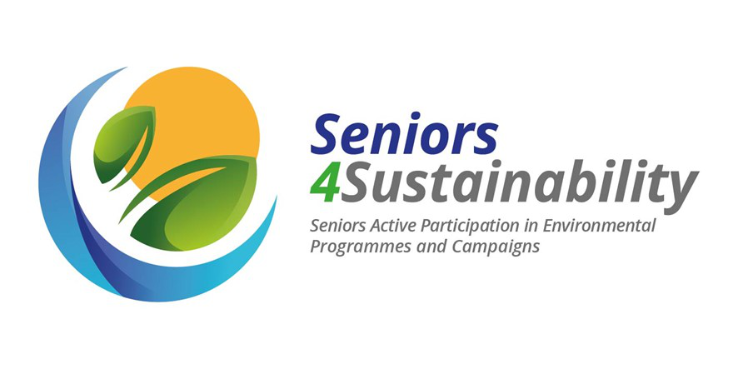Seniors Active Participation in Environmental Programmes and Campaigns
BACKGROUND OF THE PROJECT:
The ageing of population is a worldwide phenomenon with critical implications for all sectors of society. Due to low birth rates, high life expectancy and migration flow dynamics, worldwide population is “turning grey”, and Europe is not an exception. An ageing population brings social, health, economic, and other issues. Overall in the EU, the total public spending of ageing is expected to increase by 1.7% to 26.7% of GDP between 2016 and 2070. In all countries, measures to help older people remain active and participative are a necessity, not a luxury. The United Nations and the European Commission agree that quality ageing is a responsibility of all (private, public and civic actors), and can only be created and sustained through the participation of multiple sectors. People are thus encouraged to take the lead to implement programmes addressing quality and active ageing.These impressive projections feed into a variety of policy debates and processes at EU level, including the overarching Europe 2020 strategy for smart, sustainable and inclusive growth.
There is uncertainty surrounding these long-term projections, which are made under a ‘no-policy-change’ assumption to illustrate what the future could be if current policies remain unchanged. Thus, as populations grow older, the EC encourages the design of innovative policies and public services specifically targeted to older persons. The UN and the EC agree that quality ageing is a responsibility of all (private, public and civic actors), and can only be created and sustained through joint efforts of multiple sectors.
Therefore, in this context was conceived the idea of Seniors4Sustainability: “Seniors Active Participation in Environmental Programs and Campaigns” which is a 2 years Erasmus+ Cooperation Partnership in the field of adult education that aims at contributing to support the elderly by promoting their social inclusion directly through their empowerment, valorization and their active participation in environmental programs, and indirectly through targeted and general campaigns raising awareness for the third age’s usefulness and valorization, and through the encouragement of active ageing policies.
PROJECT OBJECTIVES & RESULTS:
During the 2 years of project implementation Senior4Sustainability aims to develop the following list of Outcomes & Project results (PRs):
- A multi-level project website – available in 7 Programme’s languages (EN/DE/IT/NL/ES/PT/PL) & Social Media pages.
- PR1: Best Practice Report: the project first step is the collection of national best practices to ensure that each partner addresses common issues to an agreed depth and according to ground-breaking techniques and knowledge extracted from references of excellence. This report will also include results from new surveys and debates organized with the elderly, active ageing staff, and stakeholders, namely through each partner’s network.
- PR2: Online Platform with Observatory: this result aims to develop a an online platform that will serve as a the main project documents and results repository, as well as for its relevant aims and objectives and funding information, therefore creating an e-learning/virtual Exchange environment for our target groups, and an online observatory of environmental projects involving elderly people as a showcase for successful stories/cases of green/active ageing programs in each Partner Country, also featuring a database of opportunities for senior volunteering initiatives for nature conservation
- PR3:Handbook for senior volunteers in nature: it will address relevant topics and provide an educated decision for individuals willing to volunteer, and it will be available in EN/DE/IT/NL/ES/FR/PL, allowing to be used by a very wide audience across Europe
- PR4: Senior volunteers for nature – Implementation handbook: to allow educators and volunteers to orderly implement programmes of senior volunteering for nature conservation by providing relevant resources.
- PR5: Seniors4Sustainability Training Course: Active Ageing and Nature Conservation: a modular training course that specifically addresses active ageing in nature conservation programs will be developed to support the acquisition of key high-value competences necessary for the establishing of such programs.
- C1: A 3 days Training Course for Active Ageing and Nature Conservation will be implemented in Berlin (Germany) designed for staff members of institutions dealing with elderly people or with nature conservation, willing to implement senior volunteer programs in the environmental field.
- PR6: Senior environmental volunteering programs Executive Package: this result will provide a ready-to-use documentation package for any entity wishing to implement a senior volunteer program for environmental action.
- PR7: Audiovisual instructive package: in order to supplement the learning experience for both the seniors and the staff members dealing with elderly and/or nature conservation and environmental education. Also, in order to make it more inclusive for people with reading difficulties, 5 audiovisual products will be developed, consisting in short animated videos
- PR8: Policy paper: by the end of the project, partners will develop a policy document titled “Unravelling the potential of active ageing for nature conservation” which will address the main key aspects of the project and identified stakeholders to provide the project with a wider outreach.
- A final set of 6 Multiplier Events (E1-E6) will take place in each Country relying on 35 people representing organizations of stakeholders and target audience will attend an ‘Effective Ageing and Nature Conservation Seminar’. (210 in total)
TARGET GROUPS
Initial target groups for dissemination activities inside the project consortium will comprise the following:
- Elderly people & Senior Citizens
- Staff working with third-age sector and Volunteers
- Project Partners
- Educational Staff involved in Social Inclusion, 3rd-age and the valorisation of natural resources
- Associated Partners, Stakeholders and Decision-makers, as well as Municipalities, NGOs , SMEs and adult, youth and VET education Centers, working with volunteering and non-formal education programmes
PARTNERSHIP
P1) Coordinator) Arabisch Deutsches Center für Dialog e. V. – GERMANY
P2) SMARTUP N.B. SYSTEMATIC MANAGEMENT S.L. – SPAIN
P3) Stichting Social DNA – THE NETHERLANDS
P4) Acumen Training Sp. z o.o. – POLAND
P5) Rinascita Società Cooperativa Sociale – ITALY
P6) Réseau des organisations de solidarité international – FRANCE


